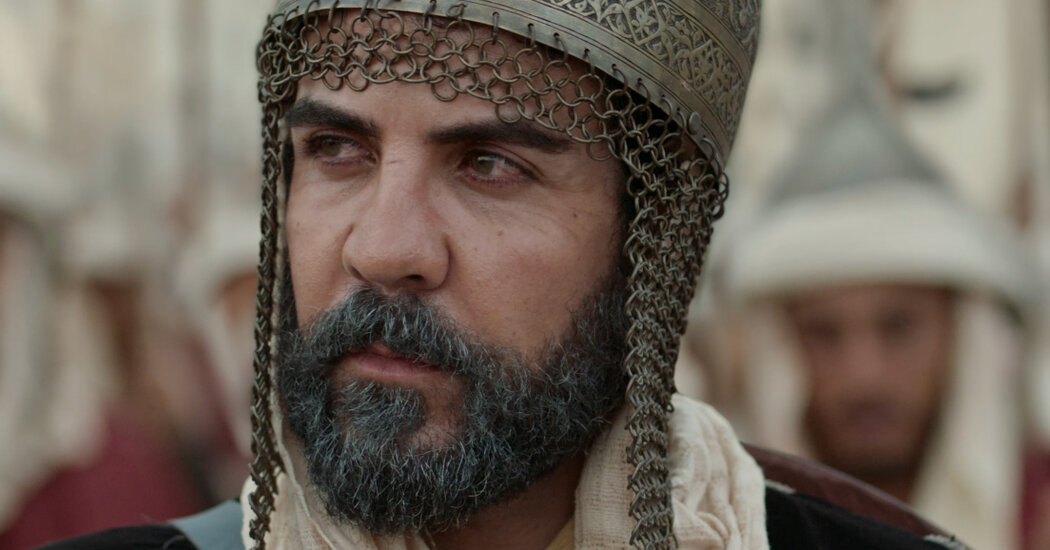A new TV series airing for the holy month of Ramadan is stoking sectarian tensions in the Middle East with the story of a divisive figure in Islamic history who is revered by Sunni Muslims but reviled by many Shiites.
The series, “Muawiya,” tells the story of Muawiya ibn Abi Sufyan, a major figure in early Islam. He was one of Islam’s early rulers and the founder of the Umayyad dynasty — the first hereditary rulers in Islam where power passed down within the same clan. He was also a reputed companion of the Prophet Muhammad.
The show chronicles events in the seventh century that led to Islam’s first civil war between Sunnis and Shiites.
The show was produced by a media conglomerate in Saudi Arabia, which, like most other Middle Eastern countries, is dominated by Sunnis. Some in Shiite Iran and Iraq, one of the only Arab countries with a Shiite majority, are balking.
Iraq’s media regulator said on March 1, the first day of Ramadan, that it would block broadcasts of the series.
“The airing of historically controversial content could provoke sectarian debates, threatening social harmony and disrupting the fabric of society, especially during Ramadan,” the regulator said at the time.
Ramadan, when many Muslims fast daily from dawn to dusk, is also peak television season in the Arab world, when families watch shows late into the night after breaking their fast.
The controversy over “Muawiya” began two years ago when the Saudi-owned MBC Group announced plans for what it said would be a groundbreaking series and billed it as one of the most expensive shows ever produced in the Arab world.
The drama seemed to be headed for air during Ramadan 2023. But the Iraqi government demanded that its Saudi counterparts cancel the broadcast, citing concerns that it could stir sectarian tensions.
The influential Iraqi Shiite cleric Muqtada al-Sadr weighed in at the time. The series was “contrary to the new, moderate policies pursued by the brotherly country of Saudi Arabia,” he said.
“There is no need to hurt the feelings of your Muslim brothers,” added Mr. al-Sadr, who largely stepped back from active politics in 2022 but still commands a significant following among Shiite Muslims.
The Saudi government then postponed the broadcast, saying the series was still in production.
But since 2023, the geopolitical dynamics of the Middle East have shifted.
Iran, a longtime Saudi rival for power and influence across the Middle East, has been weakened over the past year and a half. A good number of its regional proxies and allies have either suffered setbacks in wars with Israel or, in the case of the Assad dictatorship in Syria, fallen from power entirely.
This month, the Saudi broadcaster MBC began airing “Muawiya.”
After Persian-subtitled episodes surfaced online in Iran, the country’s media regulatory agency announced a ban at the beginning of Ramadan on dubbing and streaming the show across all on-demand platforms, websites and social media accounts.
Some Sunni religious leaders in the region have also voiced opposition to the series.
Abdel Fattah Abdel Ghani al-Awari, a senior scholar at Egypt’s al-Azhar, the most influential center of Sunni Muslim learning, said the portrayal of Prophet Muhammad’s companions on-screen was haram, or religiously impermissible.
Muawiya ibn Abi Sufyan is viewed as a key opponent of Ali ibn Abi Talib, the fourth caliph and a central figure in Shiite Islam.
The Sunni-Shiite divide can be traced back to the year 632 after the death of the Prophet Muhammad. The central dispute was over who should lead the Muslim world.
Sunnis wanted leadership to be decided by consensus, leading to the appointment of Abu Bakr as Islam’s first ruler or caliph. Shiites, however, believed that leadership should stay within the prophet’s family, favoring Ali — the prophet’s cousin and son-in-law — as his rightful successor.
Muawiya would play a central role in the first civil war in Islam following the assassination of the third caliph, Uthman ibn Affan.
After Ali was killed in 661, Muawiya challenged Ali’s son, Hasan, for control of the caliphate. Hasan would later give up his claim to avoid further bloodshed.
The power struggle was central to the Sunni-Shiite split, shaping tensions that still ripple through the Middle East today. The show’s efforts to highlight Muawiya’s legacy have been interpreted by some as a statement in favor of Sunni dominance.
The show’s writer, Khaled Salah, defended the series, insisting it did not take sides.
“Our main goal with this project was not to emphasize the narrative of the victor over the vanquished,” Mr. Salah told The New York Times on Thursday. “Instead, we produced this series to present future generations in the Muslim world with what happened, from a humanitarian aspect, during past Islamic civil wars and the lessons we can learn from them today.”
The Saudi production company MBC has faced criticism in the past for fueling sectarian tensions between Saudi Arabia and Shiite countries.
Last year, Iraqi authorities suspended MBC’s broadcast license in the country after a news report labeled former leaders of the Iran-backed militant groups Hamas and Hezbollah as “faces of terrorism.”
Soon after, Iran-linked Iraqi militias stormed MBC’s offices in Baghdad, damaging equipment, footage on social media showed.


